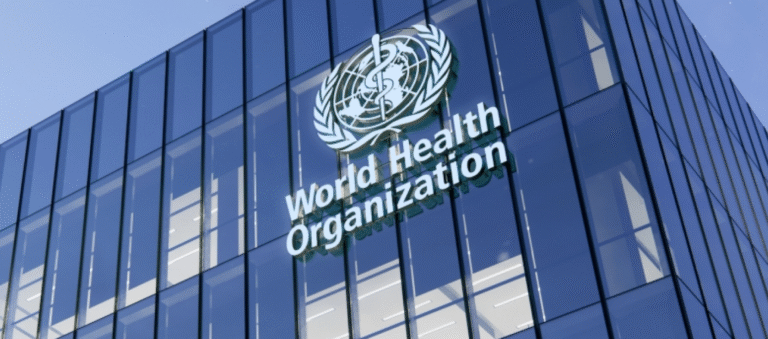
vendors sell bags of beans in a Nigerian market, where pesticide contamination is common.
ABUJA, Nigeria – In bustling markets from Kano to Lagos, in quiet village farms and city kitchens, a quiet but deadly crisis is unfolding. Every day, millions of Nigerians sit at tables believing they are nourishing their families with beans, grains, vegetables, and local staples. Yet, hidden beneath the surface of these foods are invisible toxins—banned pesticides, prohibited in Europe, China, and the United States, but still widely traded, sprayed, inhaled, and consumed across Nigeria.
In this report, Juliet Jacob explores a troubling truth: the very chemicals rejected by the world find a home in our fields, our markets, and our bodies. What fails export safety tests abroad is consumed without warning at home. What sits in plates today may cause cancer, kidney failure, infertility, or liver damage tomorrow.
“This is not just a food issue. It is a public health emergency,” warns the Alliance for Action on Pesticides in Nigeria (AAPN). “These same toxic chemicals that are banned from international markets are silently harming millions at home.”
A Bitter Harvest: When Food Turns to Poison
Nigeria’s agricultural landscape appears vibrant and productive, yet the fruits of that labour are increasingly unsafe. Over 90% of farmers still rely on chemical pesticides—many of them banned, highly hazardous, or misused. The result is a food supply chain riddled with contamination.
AAPN estimates that more than 23,400 metric tonnes of pesticides are imported every year. Over 65% of the active ingredients registered for use in Nigeria are classified internationally as “highly hazardous.” Names like Paraquat, Atrazine, and Chlorpyrifos—outlawed overseas due to environmental and health risks—remain openly stocked on market shelves from Onitsha to Sokoto.
“More than 76% of Nigeria’s agricultural exports are rejected by the European Union on safety grounds,” says Donald Ofoegbu, AAPN Lead Coordinator.
“For beans alone, Nigeria loses about $362.5 million every year due to pesticide contamination. Unless the government urgently addresses this misuse, our agricultural credibility will further deteriorate.”
While the country loses money abroad, the greater cost is domestic paid in hospital wards and graveyards.
The Human Toll: Illnesses Growing in Silence
Public health expert Prof. Babatunde Bolaji Benard explains how chemical overuse first appears beneficial—but ultimately destroys the very systems that sustain life.
“Overuse of pesticides disrupts ecosystems, kills pollinators, contaminates soil and water, and exposes farmers and consumers to chronic illnesses such as respiratory diseases, hormonal disorders, kidney failure, and cancer,” he says.
The damage is not immediate. It grows slowly—cell by cell, organ by organ.
A 2023 Heliyon study found persistent pesticide residues in everyday staples—substances known to cause nerve damage, endocrine disruption, infertility, and immune suppression.
Over 20 million Nigerians are now estimated to be living with chronic kidney disease, many without knowing the cause.
‘Nigeria Has Become a Dumping Ground’
According to Dr. Andrew Mamedu, Country Director of ActionAid Nigeria:
“Over 65% of pesticides in circulation are hazardous, while more than half of those approved in Nigeria have already been banned in Europe. Weak regulations have turned Nigeria into a dumping ground for pesticides banned in Europe and China.”
He recalls a chilling moment in public health history:
The 2020 Oye-Obi tragedy in Benue State, where 273 residents died from pesticide-linked poisoning.
Even sesame seeds—Nigeria’s top export—are now under scrutiny.
“If Japan enforces a ban due to pesticide residues in sesame, Nigeria will lose another major export revenue stream,” Dr. Mamedu warns.
Farmers on the Frontline: Desperation and Lack of Alternatives
For many farmers, the issue is not ignorance—it is survival.
“We are exposed to danger because most farmers lack knowledge of safe pesticide use,” says Zainab Isah Arah, Chair of SWOFON. “Soil fertility has been destroyed. We have been forced back to compost manure. Our products can no longer compete internationally because of these chemicals.”
Agricultural consultant Damian Ugbede adds: “Supermarkets now prefer imports to local foodstuff. Nigeria is no longer trusted as a reliable supplier.”
Inside the Supply Chain: Voices from the Field
Garba, Bean Farmer in Abuja: “Agrochemical dealers tell us Sniper works best—it’s cheap and available. Without it, the beans rot. We lose money. What else should we do? The government talks about alternatives, but where are they?”
Maryam, a Trader in Dei-Dei Market: “Sometimes beans smell strongly of chemicals. We still sell. If we tell customers, they won’t buy. Business must continue.”
Danlami, a transporter said, “We spray chemicals before loading sacks. It keeps insects away during transport. The smell is strong, sometimes it makes us dizzy. But no one checks anything.”
The tragedy is clear: those who handle the food also bear the harm.
Inside the Hospital: ‘We Are Eating Poison Daily’
At Kubwa General Hospital, Abuja, public health physician Dr. Nwachuku speaks plainly:
“Many of the pesticides in use—like Dichlorvos, Endosulfan, and Aluminum Phosphide—are banned in most countries because of their proven toxicity to humans.
People eat small quantities daily without realising it. Over time, this leads to kidney failure, liver damage, hormonal imbalance, infertility, and cancers of the prostate, lungs, and blood.”
He adds an alarming reality:
“Children, pregnant women, and the elderly are most at risk. We’ve detected Endosulfan residues in breast milk.”
Then the indictment:
“The government banned small-pack Dichlorvos in 2019, yet you can still buy it in markets across Abuja, Kano, and Lagos. About 70–80% of food sold in open markets goes untested. We are practically eating in the dark.”
Economic Paradox: Safe Export Rejected Abroad, Sold at Home
Nigeria’s export system screens food for pesticide residues. What fails the test stays in Nigeria.
Rejected abroad, consumed nationwide.
“Musa, a farmer from Kaduna said, “One rejection meant I couldn’t pay school fees. So now, I sell locally at lower prices. The food is not safe—but it is what people can afford.”
What Must Change: A Public Health Roadmap
Experts call for massive public awareness in local languages, tighter border control, subsidies for biopesticides and hermetic bags, and a National Pesticide Control Agency with real enforcement powers. A digital farm-to-fork traceability system could help track food safety from source to sale.
As AAPN asserts, “We can’t continue to trade lives for cheap food. Unless Nigeria tracks what enters its farms and markets, we’ll keep eating poison daily—and paying for it with our health.”
Nigeria stands at a defining moment. The pesticides that once protected harvests now poison the future. Without bold action—policy, education, enforcement, and agricultural reform—the toxins in our daily meals may claim more lives than any pest ever could.
The message is clear: Protect the plate or poison the nation.




